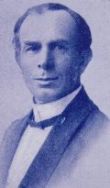Comic, singer, writer, songwriter, poet, revue company leader, director, producer.
OVERVIEW
Arthur Morley established his reputation on the Australian variety stage as a basso singer and comedian during the 1890s and early 1900s. His career peaked around 1915-1918, when he began writing and directing his own one-act musical comedies (revusicals). In this respect, he is now regarded as one of the pioneers of this once highly popular musical theatre genre, along with Bert Le Blanc and Nat Phillips. Morley's career took a drastic downturn in 1918, however, when his reputation was significantly damaged during a highly publicised defamation lawsuit taken against entrepreneur Harry Sadler. Although he later suffered a nervous breakdown, Morley eventually returned to the industry. He never regained the position he had once enjoyed as a leading variety figure, however. In the early 1930s, he was briefly associated with George Sorlie's vaudeville company.
BIOGRAPHY
Born in Queensland, possibly in Rockhampton, Arthur Morley undertook engagements early in his career (ca. 1900-1914) with companies such Percy St John and Ted Holland in Brisbane and Dix-Baker (q.v.) in Newcastle (NSW). He came to prominence on Harry Clay's Sydney and south-west NSW circuits in 1915 and 1916 as the writer/director of a number of pioneering revusicals. During this same period, he also contributed articles and poems to Australian Variety. Morley's most popular productions included On the Sands; Dockum Street, Woolloomooloo; Not a Word to the Wife; A Kiss in the Dark; Six O'Clock Closing; and the pantomimes In the Court of Father Xmas (1916) and Aladdin (1917). He later worked for the Fullers, Harry Sadler, and Reg Wykeham as revusical producer, writer, and performer. Morley's revusicals are believed to have included at least one of his own compositions. As a songwriter, he wrote both the lyrics and music, and also on a number of occasions collaborated as a lyricist with composers such as Frederick Ireland and James E. Dodds. Among his compositional credits, too, are several patriotic songs written during the First World War, which attempted to encourage (or shame) Australian men into enlisting.
While Morley's career never reached the same heights of popularity as other contemporary performer/creative practitioners such as Bert Le Blanc, Nat Phillips, and Jim Gerald, he nevertheless played a significant role in both helping to develop the Australian revusical and providing production opportunities during the local variety industry's expansion period (ca. 1915-1918). Unfortunately for Morley, his career and reputation were compromised for several years, beginning in 1918, after he was embroiled in the infamous defamation case brought against Harry Sadler by Phyllis Faye in Western Australia. A member of Sadler's company, then playing a season at the Melrose Theatre (Perth), Faye had been accused by the manager of having an affair with Morley. The subsequent court case, which the soubrette eventually won, saw Sadler's reputation attacked when Faye accused him of having tried to seduce her when she was a juvenile, while Morley and fellow troupe member Jack 'Porky' Kearns were castigated by the judge for their unacceptable behaviour. Sadler suicided the following year and Morley became the topic of much public speculation when he disappeared for several months in 1920 while suffering a nervous breakdown (possibly related to the scandal).
Morley returned to the stage in 1922 to produce a series of productions for Reg Wykeham at the Sydney Hippodrome. His last known engagements were with Bert Howard in Sydney in 1928 and with George Sorlie's Vaudeville and Revue Company in 1931. Sorlie's repertoire of revusicals at that time included two of Morley's shows from 1915, On the Sands and Not a Word to the Wife, and a new pantomime, Mother Grundy.
Morley was married to fellow variety artist Elsie Bates.
